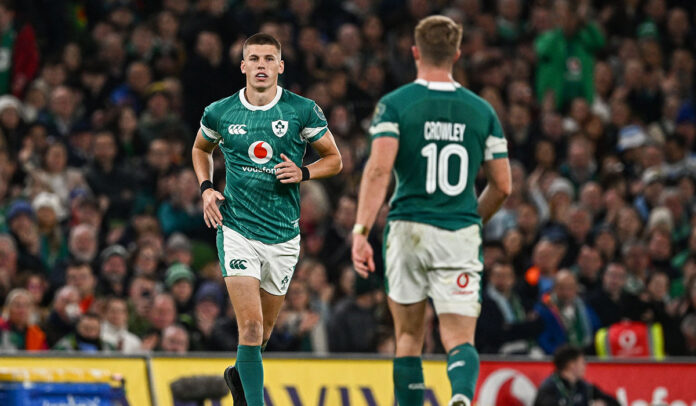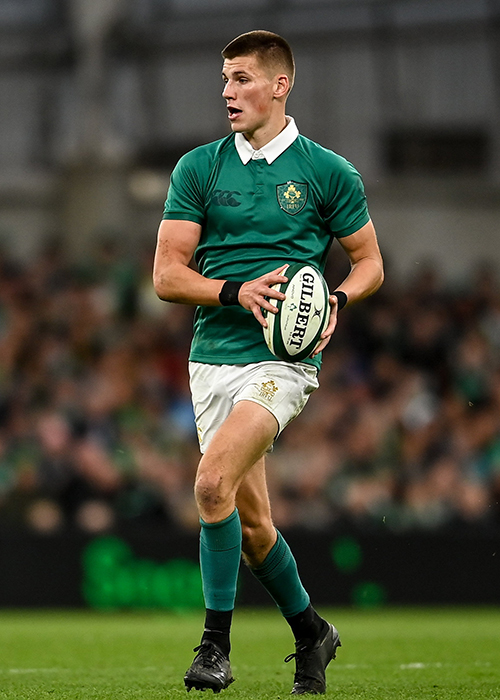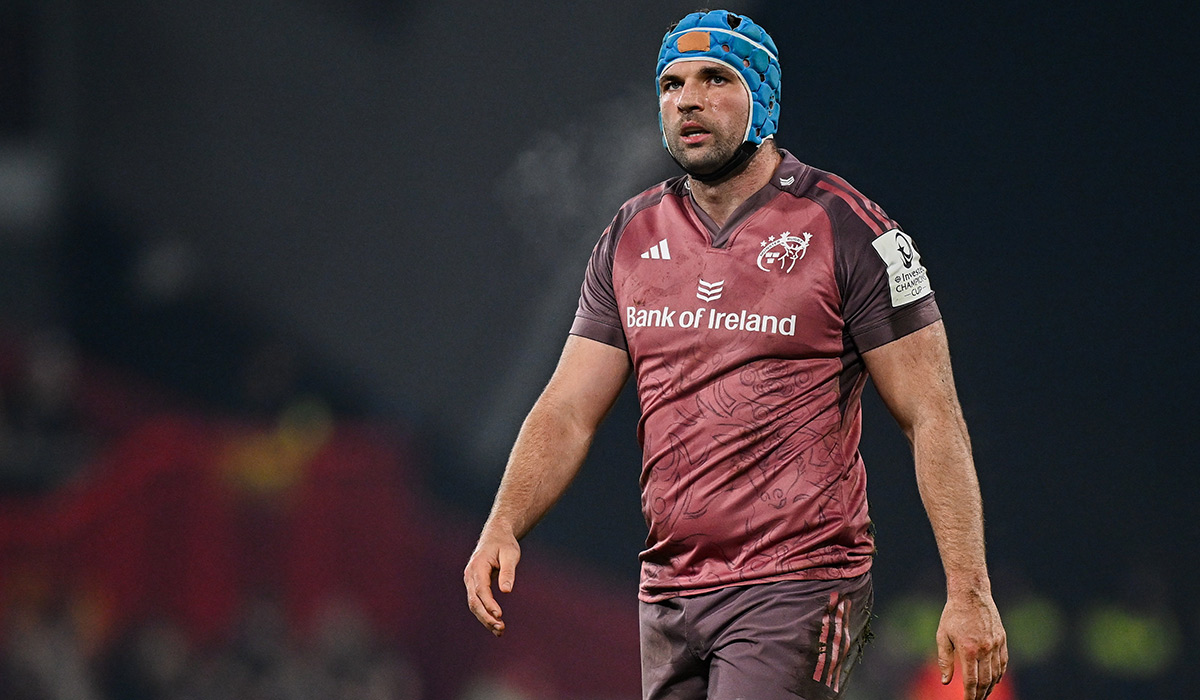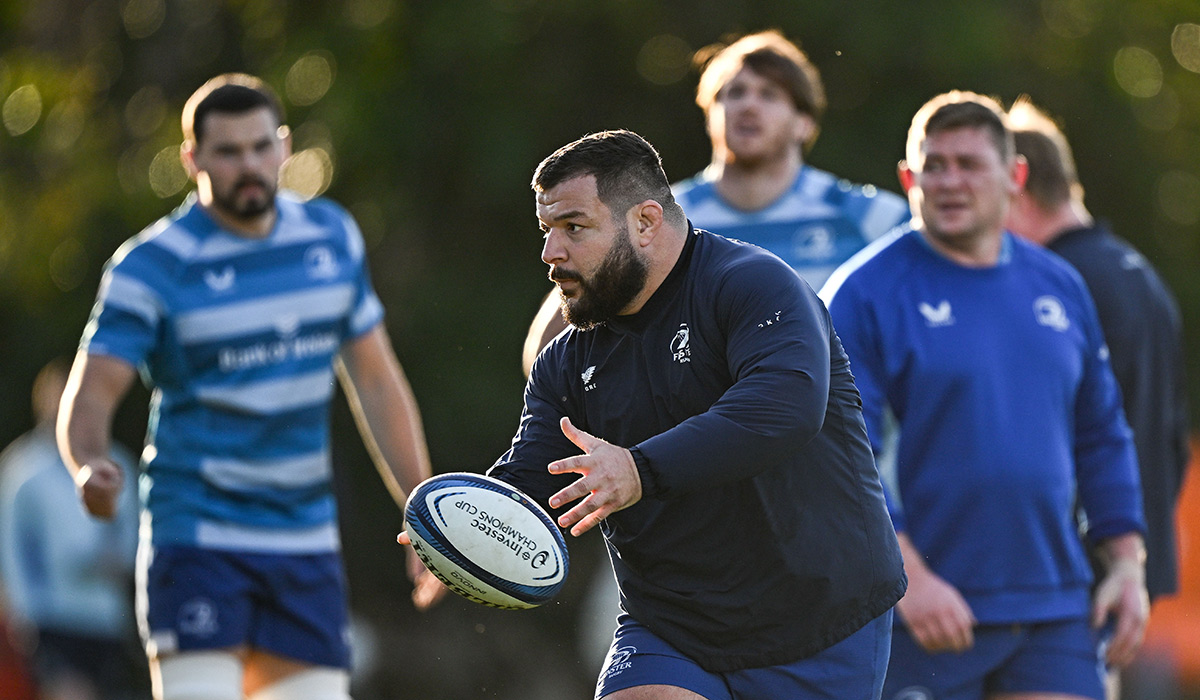
[ad_1]
Jack Crowley hadn’t played like this all season. There can’t have been many games in his senior career that brought such a performance, in fact.
The problem was that barely had the final whistle sounded on Munster’s loss to Northampton than Sam Prendergast produced enough in Leinster’s riotous victory over Bath to stay ahead in the race for the Ireland No10 shirt.
And after a storming Saturday of European action, a day worthy of the mighty January traditions of this tournament, Ireland is the focus for rugby talk now.
Munster’s Jack Crowley. Pic: Brendan Moran/Sportsfile
There may be a round of URC action next weekend, but the enormous significance of England’s arrival to Dublin in 12 days’ time governs all chat. And, inevitably, it is the discussion at out-half that brings the most glamour – and debate.
Crowley produced the strongest performance of the two contenders, almost inspiring Munster to a famous victory against a very good opponent. He did it surrounded by team-mates most of whom would struggle to get near the Leinster starting side.
More important again, he did it in a season when he has struggled for form and in which Prendergast has rocketed into the national reckoning, to the point that it will be a big surprise if he doesn’t start against the English on Saturday week. That reckoning hasn’t been greatly changed by one round of fixtures, either.
Crowley was inventive, good off the tee, and he showed unflinching courage in looking to create opportunities in a game that split wide open.
Prendergast had more difficulties to deal with as a result of Bath’s furious blitz defence in the Aviva. He rarely had time and there were occasions when he struggled under the oppressive weight.
But he was also wonderfully creative, at the hub of the inventive play that left Bath reeling in the second half. His footwork and passing are terrific, and what could be the decisive area of discussion in settling who starts in defence.
 Sam Prendergast made his Ireland debut in November of last year and is now eyeing a starting role in the Six Nations. Pic: David Fitzgerald/Sportsfile
Sam Prendergast made his Ireland debut in November of last year and is now eyeing a starting role in the Six Nations. Pic: David Fitzgerald/Sportsfile
Prendergast remains callow there, but Crowley is not so far ahead of him as a defender that it compensates for Prendergast’s other advantages.
That the No10 will be playing alongside the revitalised Jamison Gibson-Park should settle it in favour of the Leinster man. The improvement in Gibson-Park’s game over the past two weekends is a big lift for interim head coach Simon Easterby and Andrew Goodman, his attack coach.
Gibson-Park is central to Ireland’s game-plan, and the first half of his season burned slow, especially in the November window. Against La Rochelle and Bath, however, he was near his best, surviving a heavy collision of heads and a resultant cut and swollen right eye to pilot Leinster’s recovery.
A smooth line-out performance was another Leinster lift with national repercussions. The match stats recorded a success rate of 91 per cent, and it was deployed as the basis for a handful of penetrative attacks.
When the Irish line-out is going well, it serves as the ignition for their best attacks, and the combination of hooker Ronan Kelleher and locks James Ryan and Joe McCarthy were in sync on Saturday.
Tadhg Beirne has called the line-outs at Test level in recent years, and his phenomenal display for Munster was unsurprising, given his standards, but also timely, too. Along with the Leinster unit above, he will need to be at his best to get the line-out functioning consistently again. It hasn’t done that at a sufficiently high standard for two seasons, and England will be certain to go after it.
 Tadhg Beirne’s phenomenal display for Munster was unsurprising, given his standards, but also timely, too. Pic: Seb Daly/Sportsfile
Tadhg Beirne’s phenomenal display for Munster was unsurprising, given his standards, but also timely, too. Pic: Seb Daly/Sportsfile
They might fancy their chances in the scrum, too, but that was another obvious positive from the weekend action – superficially, at least.
Munster had 100 per cent success in the scrum in Franklin’s Gardens, while Leinster used their clear dominance in the setpiece as a weapon against Bath. It was one that cost the luckless visiting prop Ben Obano the last quarter of the game.
He was the fall-guy for repeated scrum penalties against his team – they gave away four over the course of the contest – and was shown a yellow card. That was his second of the game after his careless collision with Gibson-Park in the first half, so Obano had to troop off when shown a red for getting two yellows.
It highlighted a weakness with the rule, but his fate also reflected Leinster’s control. The problem was that the most effective part of their scrum on the night was a Frenchman, with Rabah Slimani suddenly deemed Test-worthy by Fabien Galthié and skipping off to camp this week with a potential store of information about Andrew Porter and Tadhg Furlong ahead of the Six Nations.
That the latter didn’t start six days after his comeback in La Rochelle may, as Leo Cullen insisted, been down to just careful management of the player but, if that was all, that in itself points up his vulnerability to injury.
Munster’s effort in the tight against Northampton also reveals qualifications that temper any optimism stoked in the immediate aftermath of their match on Saturday afternoon.
 Rabah Slimani’s France recall could see him skipping off to camp this week with a potential store of information about Andrew Porter and Tadhg Furlong ahead of the Six Nations. Pic: Sam Barnes/Sportsfile
Rabah Slimani’s France recall could see him skipping off to camp this week with a potential store of information about Andrew Porter and Tadhg Furlong ahead of the Six Nations. Pic: Sam Barnes/Sportsfile
Their starting loosehead, Dian Bleuler, had a fine game, a week after he received a standing ovation for his try-scoring performance in the win against Saracens. The problem is his three-month loan ends next week.
Munster were only allowed to sign him because of an injury run that sidelined four looseheads; his arrival conflicted with the stated IRFU policy forbidding any more non-qualified props joining the provinces, and it was only rubber-stamped because of the exceptional circumstances.
Oli Jager started at tighthead, days after he was left out of the Six Nations squad. For all that angered some MUNSTER loyalists, it was logical given the established places of Tadhg Furlong and Finlay Bealham, the progress made by Thomas Clarkson, and the reality that Jager missed a chunk of the season to injury.
Munster’s two replacement props on Saturday, John Ryan and Stephen Archer, are 36 and 37 years of age, respectively; Cian Healy, who came on for the closing minutes of Leinster’s win, is 38 in October.
It’s little wonder that the front row is now the priority area within the Irish game, both in the short-term but also as a long-term project to offset crisis in the future.
It’s a reminder that not every part of the puzzle spread out before Easterby this morning fits neatly into place.
There is the makings of quite the picture if he can get enough of the parts into the right areas. The focus on who starts as the playmaker will understandably hog headlines when the team is announced for England in a week and a half, but Ireland’s championship hopes depend at least as much as the forwards doing the dirty work.
And the signs are that they are taking to the task with relish again.
[ad_2]
Copyright for syndicated content belongs to the linked Source link

